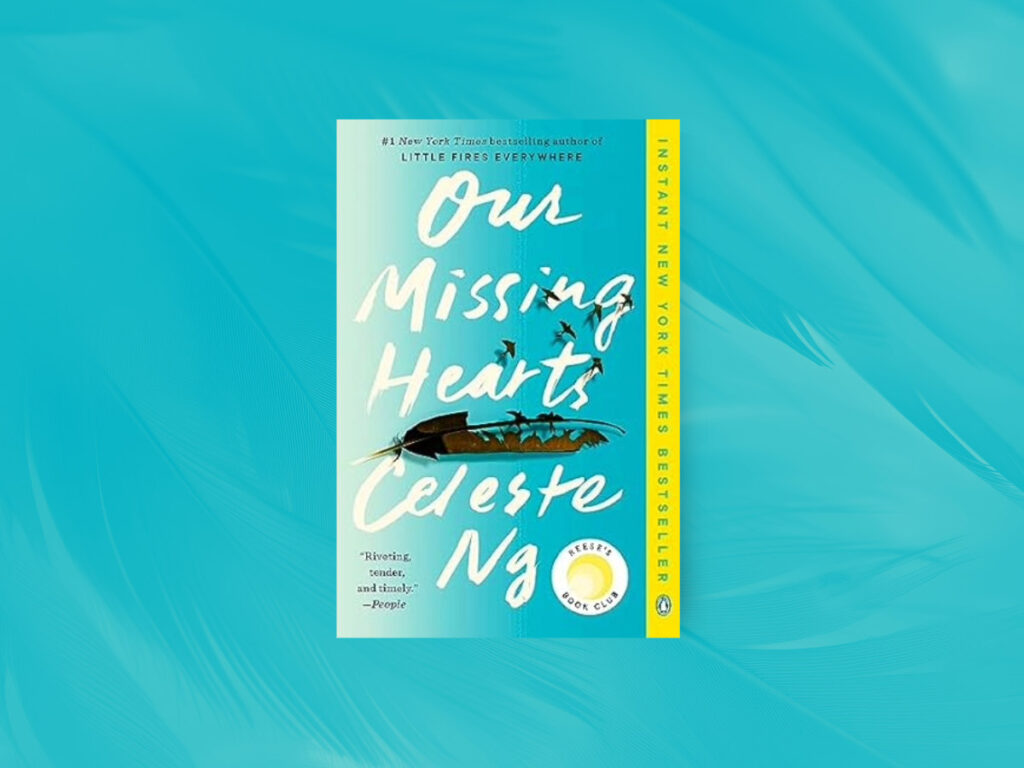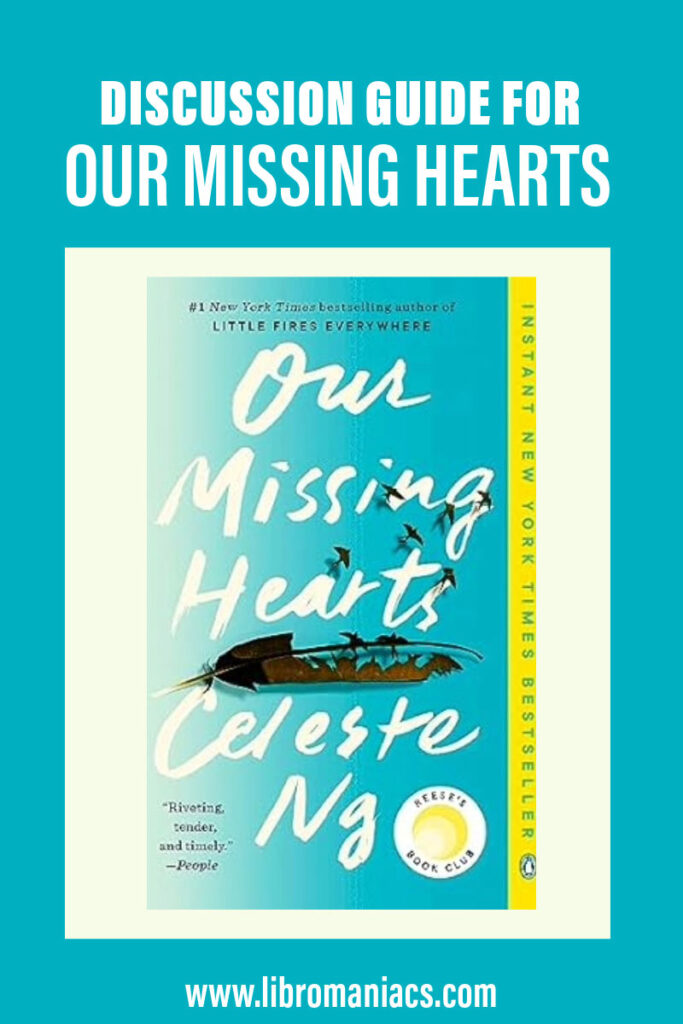Our Missing Hearts is a dystopian novel set a hair’s breadth from the world as we know it today. Saddled by grief but also propelled by hope, Our Missing Hearts is a moving story ripe for discussion with your book club. In the book, Celeste Ng tackles multiple themes, including racial and social injustice, the power of storytelling, parenthood, and the lessons and legacies passed onto offspring.
Be prepared for a robust conversation using these Our Missing Hearts book club questions. The discussion guide features a book synopsis, discussion prompts and selected reviews (see if you agree). Also, if you’ve enjoyed reading Our Missing Hearts then you may like the book suggestions provided at the end of the guide.

(This article contains affiliate links. This means that if you choose to purchase, I’ll make a small commission.)
Our Missing Hearts Synopsis
(We always chose to provide the publisher synopsis because we feel that it’s worthwhile to discuss whether the official book description actually squared with your experience of the book.)
Our Missing Hearts, Celeste Ng
Twelve-year-old Bird Gardner lives a quiet existence with his loving father, a former linguist who now shelves books in a university library. His mother Margaret, a Chinese American poet, left without a trace when he was nine years old. He doesn’t know what happened to her—only that her books have been banned—and he resents that she cared more about her work than about him.
Then one day, Bird receives a mysterious letter containing only a cryptic drawing, and soon he is pulled into a quest to find her. His journey will take him back to the many folktales she poured into his head as a child, through the ranks of an underground network of heroic librarians, and finally to New York City, where he will finally learn the truth about what happened to his mother, and what the future holds for them both.
Our Missing Hearts is an old story made new, of the ways supposedly civilized communities can ignore the most searing injustice. It’s about the lessons and legacies we pass on to our children, and the power of art to create change.
Our Missing Hearts Book Club Questions
These questions have been tailored to this book’s specific reading experience, but if you want more ideas, we also have an article with 101 generic book club questions.
- Our Missing Hearts is a story about stories. How does the author explore the power of storytelling in her novel? What role does storytelling play?
- In what ways does the author’s version of America mirror contemporary America? In what ways does it differ?
- “It isn’t just dangerous to research China, or go looking for Japanese folktales. It’s dangerous to look like him, always has been. It’s dangerous to be his mother’s child, in more ways than one.”
What is Ng trying to say about the state of our democracy and the racial injustices with her America?
- What is the metaphorical meaning of the phrase “Our Missing Hearts”? How does this meaning evoke one of Ng’s central messages?
- “He’s not sure if she can, but if there’s one thing he remembers from stories, it’s that people who offer help along your way-whether directing you to treasure or warning you of danger-should not be ignored.”
In what ways does Bird envision his journey as a fairy tale? In what ways does the novel confirm or disrupt fairy tale tropes?
- Both Bird and Sadie struggle with missing parents, yet their approach to seeking a deeper understanding of their past is vastly different. What about their personalities guide their respective strategies?
- How does Ng portray the concept of love in the book? What are the different types of love depicted in the story, and how do they influence the character’s actions?
- The link between literature and protest is very important in the novel with the network of librarians helping lost children locate their families. Why do you think this form of communication is irrepressible against forces like the Crisis or P.A.C.T? How does it affect and inspire individuals to act in the novel?
- The media portrayed Margaret very differently from reality– she was not an activist by choice. Why do you think Margaret’s poems struck a chord during the protest movement?
- Hope and resilience are some of the themes in “Our Missing Hearts.” How do the characters navigate through adversity while maintaining their humanity in the face of oppression?
- How did the ending of the book make you feel, hopeful or somber? What do you feel are the key takeaways and lessons from this novel?
Selected Reviews for Our Missing Hearts
(Use these selected Goodreads reviews to compare with your own experience of the book. Do you agree or disagree with the reviews?)
“I’ve read a lot of dystopian fiction, and this one was basically the starter dystopia book. It had all the basic features, but virtually no characters to speak of (flat,one-dimensional), and nothing really propelling the story. If you dig the setting, I think you’ll be satisfied with the book, or if you are new to this genre, but I just couldn’t attach to the story.”
“The less unstable our current world feels, the less I seem to enjoy these realistic dystopian future stories. That being said this was well written and poetic, although I thought the character development could have been stronger. One of the main narrators was a 12 year old named Bird but he felt like a flat adult voice. I know some of that would be due to the trauma in his life, but it just felt lacking to me…”
“I found this book to be unbelievably dull. I think Celeste Ng was trying so hard to establish the dystopian future she set up that she forgot that characters in dystopias are (and should be! ) still three dimensional characters! I could not have cared less about a single person in this book. It wasn’t even that long, but it could have been a lot shorter. The slowest paced book I’ve read in a long while.”
“The writing is stunningly beautiful. The story itself is both deeply poignant and soul stirringly terrifying. It’s political in a way that is both subtle and unrepentant. It takes on topics such as book banning, anti-Asian hate, inequality, brutal family separation, xenophobia and perceived patriotism. It had an “𝘐 𝘥𝘢𝘳𝘦 𝘺𝘰𝘶 𝘵𝘰 𝘭𝘰𝘰𝘬 𝘢𝘸𝘢𝘺” effect that was compelling and emotional.”
Book Similar to Our Missing Hearts
If you want more hero-librarians, we’ve got you covered with our long list of books about librarians. For some dystopic fiction on public policies gone terribly wrong, try our guide for Chain Gang All-Stars.
And if you haven’t already read Ng’s Little Fires Everywhere, we’ve got a discussion guide for it. For more Mom’s with surprises, you may also want to take a look at Tom Lake, by Ann Patchett or The House of Eve by Sadeqa Johnson.

The Leavers, Lisa Ko
The story’s focal point is on Deming/Daniel’s struggles to adjust in America and the loss and eventual reconciliation with his undocumented Chinese mother after her disappearance in Texas. This novel deals with the messy and complex issues of adoption, cultural identity, the sense of belonging in an unfamiliar place, and finding a true sense of home. One of the central themes is the power of language, showing how language is an integral part of our identity.

Bewilderment, Richard Powers
A novel set in the near future in the midst of a collapsing society with both environmental and democratic issues. The story centers around a father who studies life on other planets and his son who’s grieving his mother’s death. A heart wrenching story about overwhelming loss and grief and the struggles of parenting with science-fiction elements sprinkled in.

All You Can Ever Know: A Memoir, Nicole Chung
A touching but sometimes painful reflection of the author’s own adoption story as a transracial Korean adoptee, who was raised by a white family in a predominantly white town. The story covers the exploration of identity while illuminating the difficulties of being a transracial adoptee through a first-person narrative. The universal themes of family, belonging, and identity are what make it such a compelling read.
Have a listen on Audible. Try audio books for free for 30 days.
Share these Our Missing Hearts book club questions with your friends:

